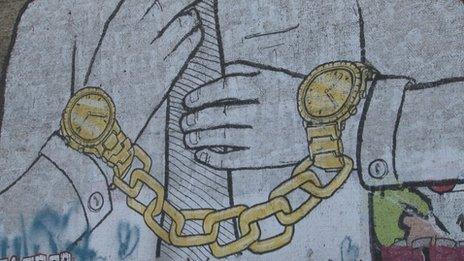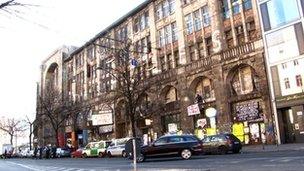Berlin torn between wealth and cool
- Published

"Work equals slavery": Graffiti in Berlin
As Berlin seeks to pull itself out of the economic doldrums by attracting investment, the BBC's Stephen Evans reports on how some feel the influx of wealth sits uneasily with the city's bohemian spirit.
"Poor but Sexy" is the way Berlin sees itself - or, at least, that's the way a mayor once described the city.
But now it wants to be rich too. Can Berlin be rich and sexy? It is wrestling hard with how to combine new money with old bohemian values - and the fight is producing flash points of tension all over the city.

An old department store in central Berlin is the scene of a permanent protest
In the city centre, an old department store turned into a squat has become a scene of permanent protest as police and bailiffs ready themselves for evictions.
Men naked from the waist up, with "victim of the banks" daubed on their chests in red paint, look at police, who explain the rules to be followed if the protest is to be kept peaceful.
Or in run-down Kreuzberg across the River Spree, BMW and the Solomon R. Guggenheim Foundation of New York have pulled back fromplans, externalfor what they call a "laboratory" of "urbanology" on a piece of wasteland.
The idea was to have a funky centre for exhibitions and meetings on this disused space on the banks of the Spree.
Think tank
The area is disused, except by walkers of dogs and graffiti artists who have turned the vast walls of the neighbouring apartment and office blocks into a canvas of anti-capitalist images, like a picture of a man in a business suit with his hands chained together, the message being "work equals slavery".
In this unlikely venue, the BMW-Guggenheim people said there would be "a combination think tank, public forum, and community center".
It would be "housed in an innovative mobile structure designed by Tokyo-based architects Atelier Bow-Wow".
And it would offer "a range of free programs exploring issues confronting urban life", which is where the Berliners who actually live this urban life came in.
Some of them went on the internet and threatened to "derail" the project, prompting the organisers to pull out.
"We're not leaving Kreuzberg because of protests, but because of the high threat level determined by the police, the threat of violence," said a spokesman, expressing regret for making the decisoin to pull out.
"While we welcome vigorous debate, we cannot risk the possibility of violence posed by a small minority."
'More money'
Richard Meng, the spokesman for the city's executive council, the Senate, told the BBC the protesters were often ageing activists who wanted change in the past, but now liked things the way they are.
"A lot of people who are now growing older were promoters of change 20 years ago but they now like it quieter because they are getting older."
As for the "poor but sexy" epithet, he says: "The mayor said 'poor but sexy' ten years ago. And this was exactly what the people felt at that time. Now we are not that poor anymore, but we are still sexy."
Not that poor, but not that rich either. The unification of Germany and the move of the capital to Berlin brought some companies to the capital but not enough to compensate for the exodus out of the city after the war, when many big companies - like Siemens - relocated their headquarters to Bavaria.
Dr Meng said: "We hope more money comes in. We need it. We really need it. We need the jobs. We don't have big money."
He sits in the magnificent, red-brick town hall, in the shadow of the TV tower which once symbolised East Berlin.
It is where the planners are wrestling with how to maintain Berlin's character but also bring employment to the area.
Squatters
A 15-minute walk away is the Tacheles. It, too, is magnificent in its way: An old, rambling department store, built in 1907 but long since fallen on hard times, and now prime development land in the heart of tourist town.
Its caverns now house squatters and self-styled artists who adorn its walls with anti-capitalist slogans.

Faded grandeur: The former Tacheles department store in Berlin
Tobias Heinze, also known as Heinzie, told the BBC: "This area was full of arty places. Now there's a high-end clothes shop. You can buy very expensive shoes. But the arty places have gone."
He is dressed in a kilt and carrying bagpipes. He is not a Scotsman, but a Berliner who also happens to love the instrument.
"Berlin has got more and more commercial, and many of the free spaces - spaces used by the public - are being closed down. I see more and more fences going up.
"It's better for some of the people, but it's not better for the locals. Berlin has one of the highest unemployment rates. And so the local people are forced to move out".
Incomers
On top of this friction over new money and old ways, there is also another fault line.
Some of the resentment happens in old areas of East Berlin, where rents are being driven up as young professionals move in from, so locals say, Bavaria.
Conservative Bavaria meets the old socialist East. It is not a marriage made in heaven. But perhaps no vibrant city has a blissful path to prosperity. Think of the Lower East Side in New York or the East End of London.
Berlin has seen change like no other. The fall of the Wall united two different attitudes to money overnight. It freed a swathe of building land right through the centre.
The transfer of the capital from Bonn brought all the moneyed accoutrements of government - lawyers, journalists and politicos of all stripes.
Rich and sexy? Perhaps not, but still not rich and dreary either.
- Published12 August 2011